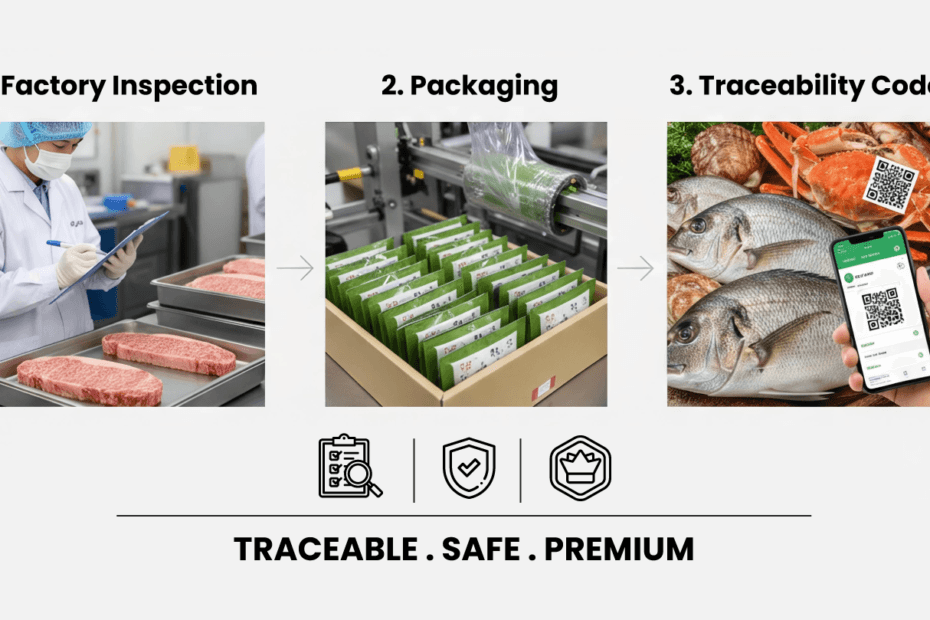Why this matters: As global demand for premium Halal products rises, buyers are no longer purchasing only ingredients — they are investing in verifiable quality and a trustworthy supply chain. Japanese manufacturers have a distinct advantage: a culture of precision, safety, and craftsmanship that resonates strongly with overseas buyers. This “factory-to-fork” integrity is what transforms a good product into a long-term business relationship.
Japan’s Quality Advantage — Craftsmanship Meets Food Safety
The “Made in Japan” label carries powerful associations: traceability, strict quality controls, and consistent product excellence. For Japanese food producers, quality management is a top priority — from raw material inspections and batch traceability to rigorous production line sanitation and employee training.
These processes significantly reduce the risk of compliance issues when exporting to demanding markets, such as the Gulf countries or premium Southeast Asian retail chains. As a result, overseas buyers are willing to pay a price premium for guaranteed quality.
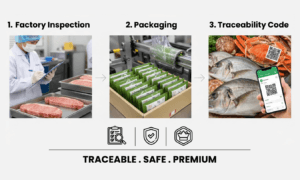
Building Halal Trust on the Production Line
Halal is not just a label; it’s an integrated management system. Japanese suppliers incorporate Halal requirements into every stage of production: raw material sourcing, dedicated production lines, sanitation procedures, employee training, and third-party or internationally recognized Halal certifications.
Key selling points to showcase in a Minisite or product page:
- Downloadable Halal certificates and batch traceability numbers
- Visual proof of segregated production lines (photos/videos)
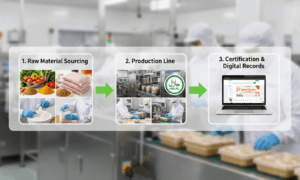
Logistics That Keep Halal Integrity Intact — Cold Chain & Certified Handlers
From the factory floor to the buyer’s warehouse, maintaining Halal integrity — especially for meat and perishable products — requires certified cold chain and warehousing solutions. Japanese exporters are partnering with specialized Halal logistics providers that offer certified storage, refrigerated transport, and customs clearance support at destination markets.
This ensures that products maintain their integrity and documentation at every stage, which is especially critical for buyers in the Middle East and premium Southeast Asian segments.
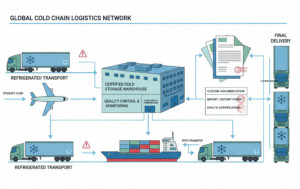
Digital Storefronts & Platform Power — Connecting Trust to Demand
Quality and compliance are only the first steps. For buyers to find and trust these suppliers, strong digital visibility is essential.
DagangHalal.com’s Minisites act as always-on, professional storefronts — combining product showcases with downloadable certificates, marketing content, and integrated compliance records. These Minisites are supported by targeted email promotions to over 60,000 verified buyers, participation in trade events with offline-to-online conversion, and category-specific campaigns that connect suppliers directly with the right audience.
Additionally, DagangHalal.com guides suppliers in applying for export subsidies and provides digital marketing training to accelerate global visibility and buyer engagement.
What Buyers Should Look For — A Quick Checklist
- Downloadable Halal certificates and batch traceability data
- Visual proof of production segregation and sanitation SOPs
- Certified logistics arrangements, including cold chain management
- Platform support for sampling, quick quotations, and trade documentation
These checkpoints help procurement teams quickly identify trustworthy Japanese Halal suppliers.
How DagangHalal Supports the JETRO Suppliers?
For the upcoming August launch with JETRO, DagangHalal.com will provide Japanese suppliers with:
- Establish a dedicated Japan Halal Export Pavilion section
- HIAS integration for compliance transparency
- Targeted email outreach to verified global buyers
- Industry-focused blog features and promotional campaigns
- Assistance with export subsidy applications
- Digital marketing training to drive inquiries and orders
These services help suppliers move from “certification-ready” to “order-ready” much faster.
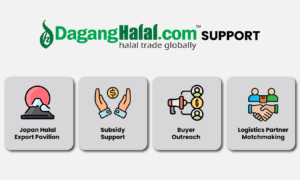
Why “Factory-to-Fork” Matters for Japanese Halal Suppliers?
Japan’s quality and craftsmanship give its Halal exports a natural competitive edge. But turning that advantage into consistent orders requires connecting the dots from production compliance to logistics assurance to digital visibility.
Once this end-to-end “Factory → Certification → Logistics → Digital Exposure → Buyer” chain is in place, Japanese suppliers can enter and expand in the Middle East and Southeast Asian markets with confidence, transparency, and long-term trust.
Key Takeaways
✔ “Made in Japan” quality and traceability appeal strongly to premium Halal buyers.
✔ Embedding Halal compliance into production lines — and documenting it digitally — is essential for building trust.
✔ Quality alone isn’t enough; exposure, targeted promotion, and logistics assurance turn interest into orders.
✔ DagangHalal.com provides the platform, tools, and support to help JETRO suppliers succeed in global Halal trade.
Want to preview the upcoming 10 Japanese suppliers or request a buyer-supplier meeting? Contact DagangHalal.com’s marketing team and share your procurement needs — we’ll prioritize your match when the suppliers go live.
